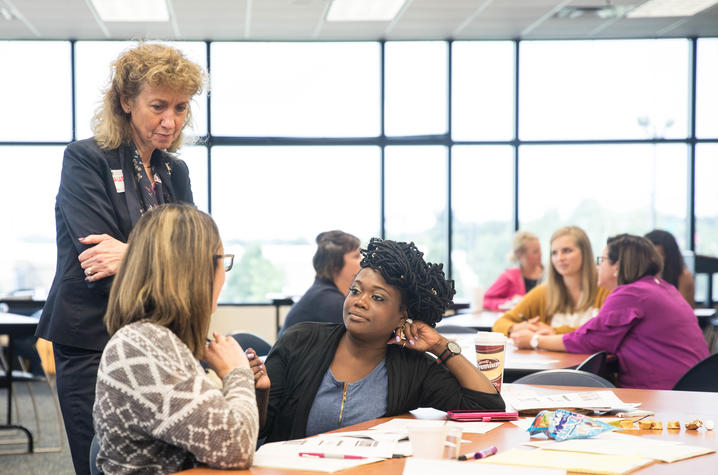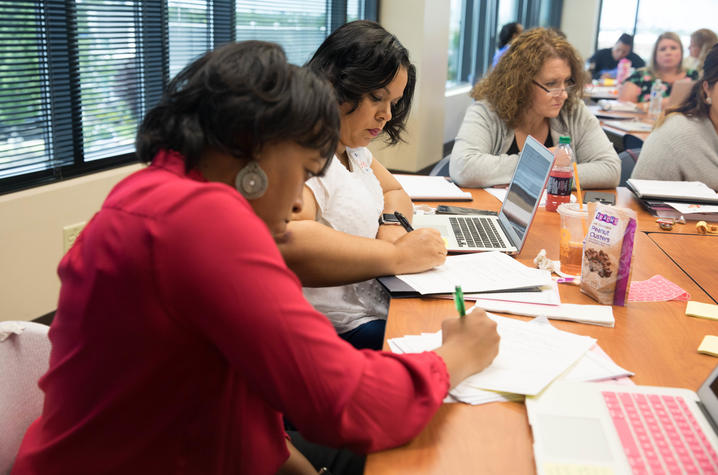How UK Spent the Summer: Training Educators to Assist Students Dealing with Trauma
LEXINGTON, Ky. (Aug. 16, 2018) — Focusing on school work can be difficult for a student who doesn't know where their next meal will come from or one who experiences violence at home. These factors impede a child's ability to focus, behave and learn the information and skills necessary to be successful later in life. Teachers, principals, counselors and other personnel from public schools across the Commonwealth participated in training provided by the University of Kentucky Center on Trauma and Children (CTAC) to better understand how these experiences impact students and learn the best way to support and assist students.
These trainings teach personnel to provide emotional "wrap-around" services to students. This is done so, not only are students' behavioral or academic issues being addressed, but the underlying cause of those issues is understood, and personnel can assist in providing support and solutions.
During three two-day mini-learning collaboratives, Kentucky Department of Education personnel were given the opportunity to learn the ways exposure to trauma manifests in student behavior, the impact that can have on the learning environment and provided them with classroom strategies that could be implemented to ensure physical and psychological safety for all students.
Jordan Letcher, who has been an eighth grade counselor in Clark County for the past four years, participated in the training for the first time this summer. While she is trained to provide support to students, she said this training provided more strategies to implement what they learned. "During my education as a counselor, they give you techniques but with this training, they give you examples and curriculum to take back and implement," she said.
According to the U.S. Department of Health and Human Services, Kentucky has the second highest rates of child abuse and neglect in the nation. "Research tells us trauma and traumatic stress interfere with a student's ability to learn," said Ginny Sprang, executive director of CTAC.
The amount of time students spend in school, means teachers and other staff are in a unique position to provide assistance, Sprang said. "Teachers spend more time with these kids than most other people in their lives, without school-based intervention students may drop-out or have difficulty learning, which sets them up for a lifetime of difficulty."
Over the past four years, these types of trainings have been possible because of CTAC and the Project Advancing Wellness and Resilience Education (AWARE) grant awarded by the Substance Abuse and Mental Health Services Administration to the Kentucky Department of Education.
Shericka Smith, the Project AWARE grant manager for Fayette County Public Schools and a social worker, sees the trainings as very helpful to the personnel who are already so dedicated to teaching and supporting students. "We have a great group of mental health professionals and extra training with CTAC is something we want to take advantage of," she said.
Smith also says the benefits of this type of training are being seen by the staff members who are implementing the skills they are learning. "Teachers who have been through this training process see positive outcomes in behavior, academics and coping," she said. "The skills they learn prevent future problems, and they [educators] are able to see opportunities for intervention."
Letcher encourages others to participate in this kind of training, especially teachers and administrators.
"We [counselors] deal with trauma and students who experience trauma everyday and we knew that would be the case coming into our profession," she said. "This training can help them [teachers and administrators] see children from a different perspective and understand why students have the behaviors they have."
For many, summer is a time to slow down, get a break from school and maybe take a vacation. At the University of Kentucky, summer is when our faculty, staff, clinicians and students prepare for a new school year, conduct research, treat patients and gain experience through internships and service work. Class may not be in session, but at UK we never slow down.






